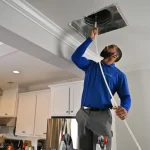As the seasons transition, homeowners often find themselves adjusting to changing temperatures and weather conditions. One crucial aspect of this adjustment involves ensuring that their heating, ventilation, and air conditioning (HVAC) systems are in optimal condition. Expert HVAC inspection services play a vital role in preparing these systems for the demands of different seasons, providing peace of mind and enhancing energy efficiency.
Regular HVAC inspections are essential for maintaining system performance and longevity. During seasonal changes, these inspections become even more critical as they help identify potential issues before they escalate into costly repairs or complete system failures. An expert inspection typically includes a thorough examination of all components such as filters, coils, thermostats, ductwork, and electrical connections.
One significant benefit of scheduling an expert HVAC inspection before seasonal changes is improved energy efficiency. As temperatures fluctuate between extreme cold or heat, an efficiently running system can significantly reduce energy consumption. Inspectors ensure that all parts are clean and functioning correctly; this not only optimizes performance but also minimizes unnecessary strain on the system. Clean filters and coils allow for better airflow while preventing dust buildup that can hinder operation.
Moreover, regular inspections contribute to enhanced indoor air quality—a critical factor during seasonal transitions AI Sex Chatbot App when homes may be sealed tightly against outdoor elements. Experts check for mold growth within ducts or other areas where moisture accumulates due to temperature differences between indoors and outdoors. Addressing such concerns promptly prevents potential health hazards associated with poor air quality.
Safety is another paramount reason why expert HVAC inspections should precede any major shift in weather patterns. Faulty wiring or malfunctioning components pose serious risks like fire hazards or carbon monoxide leaks—dangers easily mitigated through professional assessments conducted by trained technicians who understand what warning signs indicate impending trouble.



